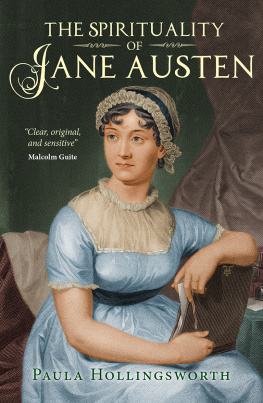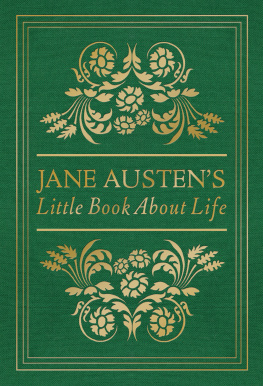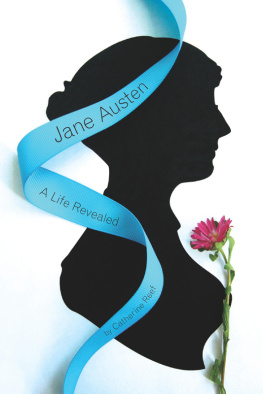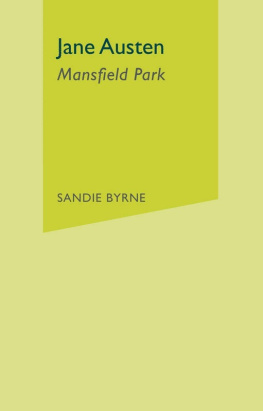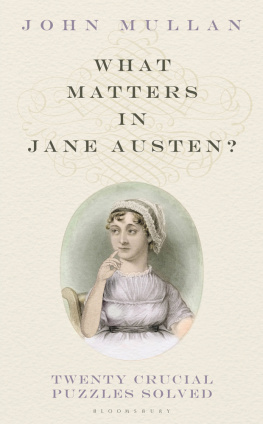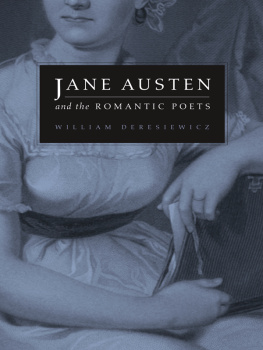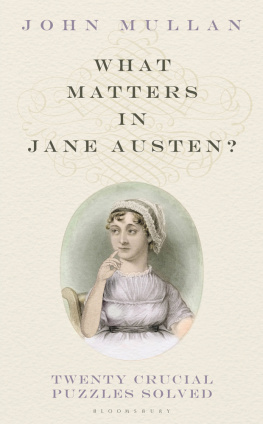Jane Austen is by any standard a giant of English literature, and yet the distinctively Christian nature of her writing has been unfairly overlooked for far too long. It has been so because it is oblique and subtle rather than self-evident, but it is nonetheless vital. Paula Hollingsworth has thus done us an enormous favour in opening a door onto this fascinating aspect of Austens work. Indeed if we ignore this perspective we will never properly appreciate her writing in its true depth.
Philip Mounstephen, CMS
Spirituality is not a word that Jane Austen would have used, as Paula Hollingsworth is quick to point out. Nevertheless this clear, original, and sensitive study brings out the much-neglected spiritual and moral dimension of Jane Austens work. Hollingsworth offers a fresh reading of the novels that restores both their moral depth and Austens gentle awareness of the sacred frame within which we live our lives. Given the way so much modern critical discourse secularises the past, it is refreshing to read a book which is so alert and sensitive to Jane Austens own beliefs and which makes her spiritual insights so richly available to modern readers.
Malcolm Guite, author of Faith, Hope and Poetry
Paula Hollingsworths study is made with the same careful observation and sensibility as its subject, Jane Austen. Paula opens up the intimate realm of the inner life and sets it in the social context. She illuminates both the texts and the person, and makes a significant contribution to the readers understanding and enjoyment.
Alison White, Bishop of Hull
Text copyright 2017 Paula Hollingsworth
This edition copyright 2017 Lion Hudson
The right of Paula Hollingsworth to be identified as the author of this work has been asserted by her in accordance with the Copyright, Designs and Patents Act 1988.
All rights reserved. No part of this publication may be reproduced or transmitted in any form or by any means, electronic or mechanical, including photocopy, recording, or any information storage and retrieval system, without permission in writing from the publisher.
Published by Lion Books
an imprint of
Lion Hudson plc
Wilkinson House, Jordan Hill Road,
Oxford OX2 8DR, England
www.lionhudson.com/lion
ISBN 978 0 7459 6860 5
e-ISBN 978 0 7459 6861 2
First edition 2017
Acknowledgments
Scripture quotation marked KJV is taken from the Authorized (King James) Version: rights in the Authorized Version in the United Kingdom are vested in the Crown. Reproduced by permission of the Crowns patentee, Cambridge University Press.
Scripture quotations from the Vulgate Bible were checked at www.vulgate.org pp. 10, 106, 109, 110, 137, 156, 160: Extract from A Memoir of Jane Austen and Other Family Recollections 2002 J E Austen-Leigh, reprinted by permission of Oxford University Press.
pp. 15, 106, 119: Extract from Jane Austens Letters 2011 Deirdre le Faye, reprinted by permission of Oxford University Press.
p. 33: Extract from A History of Jane Austens Family 1988 George Holbert Tucker, reprinted by permission of Sutton Publishing.
A catalogue record for this book is available from the British Library
Cover image: Stock Montage / Getty
Dedicated with love
to
Audrey Hollingsworth
19311983
C ONTENTS
W hen I mention the words Jane Austen and spirituality in the same sentence, many peoples first response is, I didnt know she was spiritual, before they then add, Mr Collins! referring to Jane Austens wickedly mocking portrayal of a clergyman in Pride and Prejudice. Elizabeth Bennet comments to her father, on hearing Mr Collins words for the first time in his letter to Mr Bennet: There is something very pompous in his style Can he be a sensible man? No, my dear, I think not is her fathers response. I have great hopes of finding him quite the reverse. There is a mixture of servility and self-importance in his letter, which promises well. I am impatient to see him. Pompous, servile, and self-important these are the characteristics of Mr Collins throughout the novel. To some readers of her books, then, it comes as a surprise to learn that a large number of Jane Austens family, including her father and two of her brothers, were clergymen themselves. Moreover, instead of being offended by her irreverent portrayal of Mr Collins, her family delighted in him. Janes mother, who was the daughter, the wife, and the mother of clergymen, declared that Mr Collins even outclassed Lady Catherine de Bourgh in being her favourite of all of Janes characters. An attack on one clergyman (or even more than one, as Austen has others who do not measure up) was not seen, by Janes family, as an attack on them all, or on the Christian faith in general.
A closer examination of Mr Collins appearances in the novel, however, reveals that Jane Austen only portrays him in a social role. We see him at evening gatherings, parties, and balls in the town of Meryton, at Mr Bingleys home at Netherfield, and at Rosings, the illustrious home of his redoubtable patron, Lady Catherine. We also see him at home with the Bennet family at Longbourn, and in his own humble abode, Hunsford Parsonage. Jane Austen never describes him leading services at Hunsford Church, she never mentions the nature of his private prayers, and she does not reveal to us anything about Mr Collins inner spiritual life.
What then might be the spirituality of his creator, Jane Austen? Behind the many social gatherings, the balls, and the parties in her novels, are there glimpses of a deeper spiritual awareness in her storylines, or in the lives of any of her other characters? And what of Jane Austen herself ? Her novels have been constantly in print for the two hundred years since her death in 1817, and they continue to be read and enjoyed by millions of people all around the world. Is there anything of enduring depth in her own life, in her inner spiritual journey, which might correspond to the enduring quality of the writings that she left behind?
The testimony of her nephew James Edward Austen-Leigh is that, in Jane Austens life and writings, we do find deep spiritual resources, but we need to dig deeply to uncover them. For, in his memoir of his aunt, he wrote:
I do not venture to speak of her religious principles: that is a subject on which she herself was more inclined to think and act than to talk , and I shall imitate her reserve; satisfied to have shown how much of Christian love and humility abounded in her heart, without presuming to lay bare the roots whence those graces grew.
Many of us today, in exploring a persons spirituality, might want to search more widely than the religious principles and the specifically Christian love and humility referred to here by James Austen-Leigh. However, we must proceed with great care in relating the term spirituality to Jane Austen. For spirituality is not a word that was in common usage in her day; our use of the word and our understanding of its current meaning would not have been part of either her vocabulary or her understanding. The word spiritual is often used today where the word religious would have been used in Jane Austens time, but many people today use the word spiritual in a broader sense than the word religious , which refers to the following of the pathway laid down by a specific world religion. We also need to be aware that Jane Austen, in the context of her times, would use the word religious in a narrower sense than we would. Though she would have had an awareness of people of other faiths than Christianity, she would have associated Islam and Hinduism with places and people far away from England. There was a small Jewish population of about twenty-five thousand living in England in the late eighteenth and early nineteenth century, the majority of whom were exiles from Germany and Holland, but they lived predominantly in close-knit communities in London and other large cities. The world in which Jane lived was a very different one from ours, so we have to be careful not to impose a modern, global, multi-religious world view on her novels and experience.

